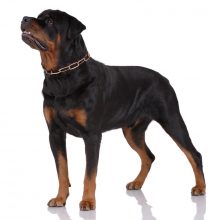Rottweiler
Lifestyle Needs

The Rottweiler has had various working functions since its origins, but most importantly guarding livestock. He is a handsome, large, extremely strong and agile dog with natural guarding instincts. He loves to work and loves to train in obedience. He has been given a bad press in recent years due to inappropriate treatment by some human owners. He is generally not aggressive by nature but if aroused will put up a fight. He needs an experienced and intelligent owner who will give him the challenges he deserves. He should have plenty of exercise, including free running, every day. Groom once a week. Average lifespan 9 years. Males are significantly heavier, shorter-lived and predisposed to aggression than females.
Genetic Diversity
(Known as Coefficient of Inbreeding: 'COI'. It should be as low as possible.)
The UK Kennel Club breed average COI is 6.0% - See 'A Beginners Guide to COI'
Gene Pool Size
(Known as Effective Population Size: 'EPS')
190.8
EPS is a measure of how many individuals are contributing genetically to a breed population. It is a measure of the size of the gene pool in a breed. Lower than 100 is considered critical by conservationists and below 50 brings a breed close to extinction. For more information see the Kennel Club article.
Health and Welfare Problems due to Conformation
(Body shape and physical characteristics)
- Gastric dilatation volvulus (GDV)Bloat / Torsion
- Aggression can be a problem in this breed
BVA/KC Health Schemes: www.bva.co.uk/chs
- Hip dysplasia: breed 5 year mean score 9.1 (parents should be lower) Very high incidence in this breed – 30 -50%.
- Elbow dysplasia: ideally O:O (Grades 0-3)
- Eye Disease: Multifocal Retinal Dysplasia (MRD) (litter screening); Progressive retinal atrophy (PRA) (annual testing); Entropion; Ectropion; Cataract
Estimated Breeding Values (EBVs) : EBVs for Hip and Elbow Dysplasia are available for this breed
www.thekennelclub.org.uk/about-ebvs
DNA Tests Available
DogWellNet and IPFD Harmonisation of Genetic Testing for Dogs (HGTD)
www.dogwellnet.com/breeds
- Juvenile Laryngeal Paralysis and Polyneuropathy (JLPP)
Availability of a DNA test does not mean that it is always necessary or even desirable for breeders to use this test.
Other Breed-Specific Health Screening Schemes
- Bitches not to produce a litter under two years of age.
- Bitches not to produce more than one litter within a 12 month period
- Bitches not to produce more than 5 litters in their lifetime
Heart disease: Doppler Echocardiography (Aortic Stenosis and Dilated Cardiomyopathy)
Ask the breeder to show you the certificates for the above tests/screening for both parents. If any of the above tests have not been considered necessary by the breeder (and there may be good reasons), ask her to explain why.
Other Diseases Reported
(For which there are currently no genetic or screening tests for sire or dam)
- Cancer: Osteosarcoma (and other types of cancer)
- Wet Eczema
- Cranial cruciate ligament disease (CCL)
- Osteochondrosis (OCD) of shoulder, stifle and hock
- Cold Water Tail
- Entropion
- Ectropion
Ask the breeder about the medical history of the parents, grandparents and great grandparents. Consider carefully whether to purchase a puppy if some of these or other diseases are in the family line.
Ask about the breeder’s policy in cases of serious genetic diseases occurring to your puppy in later life. Good breeders will request to be informed of such events in order to improve future breeding decisions.
You are strongly advised to buy from a breeder who uses (or is prepared to use) the AWF Puppy Contract and Puppy Information Pack (PIP): www.puppycontract.org.uk
The breeder should also be familiar with the CFSG/DBRG Code of Practice for Dog Breeding